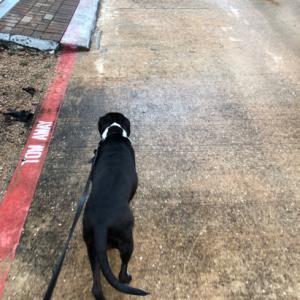We get there quickly, we come back slowly.
Nessie, the wonder dog, becomes so excited when she hears “going out” that she scarcely can be walked to the park. She strains, surges, trots to the place where other dogs may be, poops can be made, and balls caught. If there is another dog there, and I have a tennis ball, and she must go poop, she will sometimes leap about in confusion trying to do all three things at once. This sometimes goes well. Usually, however, none of activities is as splendid as they might be as friends, poops, and fetch are all marred by the mixture.
There is a lesson here for me, though fortunately not so direct. I have never to my knowledge wanted to fetch. The notion of taking on joy at a time or at least making sure that each pleasure is appropriate to another before trying to mix the two is very good advice. I enjoy Dijon mustard and strawberry jelly, but never at the same time.
Walking Nessie home after her larks is more instructive at my age. There comes a time in the park when she walks instead of runs, lays down to let her friends come to her, and is finished with other business having cleaned her paws on the grass. She keeps the ball finally and sits before the gate: time to go home. She walks slowly, often holding the ball lest I throw it. She wants a Bone Treat and a nap.
So it goes with many tasks in life. We rush to get started, do all we can in a rush, and then wearily go home. One could reflect on the end of life: getting to some peak and then slowly going to our true eternal home.
Yes.
But the other day I had a more cheery thought about our eternal home: we get there quickly, we come back slowly, we rest, and we bound back the next day. We get there in moment, an eternal rest, that always to live in a new day. The end of the day foretells the joys of the day to come!
After a night’s sleep Nessie recalls the park, poops, fetch, and friends and is ready to go again. She rests to play. The list of joys is, for her doggie soul, expansive and inexhaustible. She is ready to see what the park will hold, because who knows what combination of larks will be there that day? What odors? Mud? Strange plants to pull and eat?
This is the very image of eternity! We will have so many joys that will never, human as we are, be able to exhaust them. The paradise of God will be so expansive, the pleasures so varied, that we will be renewed continually. When we have been there ten thousand years, bright shining as the sun, we will have no less days to sing God’s praise than when we first begun! Our methods of praising God, of taking pleasure in His goodness, all His truth, and sublime beauty will be inexhaustible.
In the image, we might rush from our heavenly homes to the feast to see what God has in store that day. We will praise Him by what to Him are simple pleasures, but to us, as eternity unfolds, will be dazzling. They will be human and so there will be pattern, rhythm, and order, but just as Nessie experiences each day of fetch as new, so we will find the newness in some intellectual discovery (though we made one yesterday), act of creation, or moment of pure charity. God will take us there, straining for the new day, and then we will be renewed in a land without evil or fear.
We are not, naturally, merely dogs. God has given us wills, a power to consent, to choose and create in ways Nessie cannot. We are also not less than dogs. As animals, something we will also be for eternity, we will have bodies and an eagerness to stretch, run, be alive. We will have all those pleasures and those of a human. We get there quickly, pray for us Mother Mary at the hour of our death, come home slowly, in the sleep of death, and bound into the next Day.













